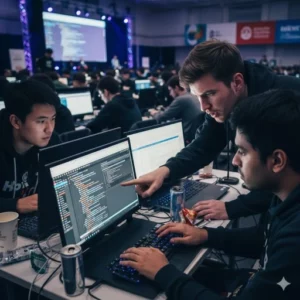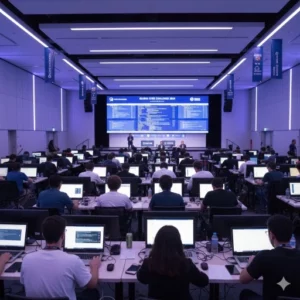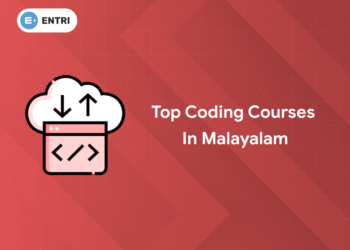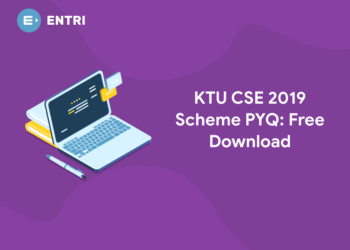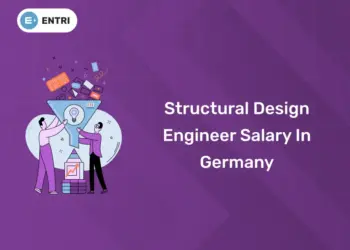Table of Contents
Key Takeaways:
- Competitive programming develops problem-solving and coding speed essential for tech careers.
- Selecting the appropriate language and grasping DSA concepts are crucial for success.
- Regular practice on platforms like LeetCode and CodeChef builds skills and confidence.
- Mock contests and community support enhance learning and contest strategy.
- Entri’s AI-powered courses offer personalized learning and placement aid for competitive programmers.
Introduction
Coding competitions have rapidly transformed from niche events into global phenomena that attract programmers from every corner of the world. Whether you are a college student dreaming of landing a coveted internship, a professional aiming to sharpen your problem-solving skills, or someone who simply loves challenges, coding contests offer a unique blend of adrenaline, learning, and career advancement. The joy of cracking an algorithm that seemed impossible, beating the clock, and seeing your rank rise on a leaderboard is an experience many coders cherish deeply.
However, starting or excelling in competitive programming can feel intimidating. You may wonder which languages to choose, what topics to learn first, how to practice smartly, or how competitions even impact your real-world career. This comprehensive, human-friendly guide—curated with insights from top programmers and the latest 2025 trends—will demystify the entire process and help you build a winning strategy, from your first code to podium finishes and beyond.
What is Competitive Programming?
1: Which of the following data structures allows elements to be added and removed in a Last-In, First-Out (LIFO) order?
Competitive programming is essentially a mental sport where you write code to solve well-defined algorithmic problems under time constraints. Each problem evaluates your ability to use data structures, algorithms, mathematical reasoning, and code optimization skills efficiently. Competitions run on renowned online platforms with contests that span from beginner to expert levels, making the arena accessible and vibrant.
Power up your career with Entri’s Python Course
Why is it Growing So Fast?
The accessibility of these platforms online and the growing recognition by top tech companies make competitive programming increasingly popular. It also fosters a community spirit where coders challenge and learn from each other, turning problem-solving into a social and rewarding journey.
Build Better, Together. 🛠️ Join the Entri Coding Community!
Beyond syntax, there’s strategy. 🚀 Join our subreddit for: Exclusive Coding Roadmaps 📍,Project Case Studies 📂 ,Interview Prep Tips 💡and more
👉 Join our Reddit communityStep-by-Step Guide to Prepare for Coding Competitions
1. Choose the Right Programming Language
Selecting a language that suits both your skill level and the demands of competitions is key.
| Language | Why Choose It? | Ideal Use Case |
|---|---|---|
| C++ | Fast execution with robust STL library | High-performance, time-critical contests |
| Java | Object-oriented, BigInteger class for large computations | Complex math-heavy problems |
| Python | Simple syntax, extensive libraries | Rapid prototyping, beginners |
Tip: Start with Python if you’re new; switch to C++ as you advance for speed advantages.
2. Master Data Structures and Algorithms (DSA)
DSA is the backbone of every coding competition success story. A strong grasp here can turn a daunting problem into a manageable puzzle.
- Beginner Basics: Arrays, Strings, Stacks, Queues, Sorting algorithms.
- Intermediate: Trees, Graphs, Hash Tables, Binary Search.
- Advanced: Dynamic Programming, Greedy Algorithms, Segment Trees, Network Flows.
Understand algorithm complexities (Big O notation) to write efficient solutions.
3. Use Top Competitive Programming Platforms
Practice on these top-rated platforms, which regularly host contests and feature extensive problem archives:
- LeetCode: Best for interview prep and weekly challenges.
- CodeChef: Diverse contests from beginner to expert.
- Codeforces: Frequent contests and educational rounds.
- HackerRank: Role-based certifications and challenges.
- AtCoder: Japanese platform loved for quality problem sets.
4. Develop a Consistent Practice Routine
Set achievable daily or weekly goals:
- Solve 2-3 problems/day initially, increasing difficulty gradually.
- Focus on understanding problem statements completely.
- Practice writing clean code under timed conditions.
- Regularly review editorials to grasp different solving techniques.
- Participate in live contests to gain experience and track progress.
5. Learn from Past Contests and Mock Tests
Reviewing previous contest problems builds familiarity with patterns:
- Analyze solutions to common problem types.
- Take timed mock contests to simulate pressure.
- Identify weak spots and revise topics accordingly.
- Join group problem-solving sessions for diverse perspectives.
Become a Full-Stack Developer now!
6. Master Debugging and Code Optimization
Debugging skills save precious time during contests:
- Learn to recognize common bugs like off-by-one errors or infinite loops quickly.
- Use modular programming to isolate issues.
- Optimize code by using efficient data structures and algorithms.
- Practice with online debuggers and test harnesses.
7. Understand Contest Rules and Environment
Know the platform and contest specifics beforehand:
- Familiarize yourself with input-output formats.
- Use templates and snippets to speed coding.
- Know penalty rules, submission limits, and time zones.
- Optimize your setup for quick submission and error correction.
8. Collaborate with the Community
Competitive programming is a team sport culturally:
- Join forums, Discord channels, or coding clubs.
- Share your approach and get feedback.
- Learn from top coders’ solutions and streams.
- Stay motivated through peer support.
Delve into the world of Data Science and make it a Career with Entri!
Sample 3-Month Preparation Plan
| Week(s) | Focus Area | Activities |
|---|---|---|
| 1 – 4 | Programming basics and data structures | Study arrays, strings, basic sorting; solve easy problems |
| 5 – 8 | Algorithms and intermediate topics | Graphs, binary search, greedy algorithms, practice contests |
| 9 – 10 | Practice and review | Take mock contests; analyze mistakes, speed work |
| 11 – 12 | Advanced topics and refinement | Dynamic programming, segment trees, optimize solutions |
Why Join Coding Competitions?
- Sharpen Problem-Solving Skills: Frequent exposure to diverse problems helps you approach challenges methodically.
- Ace Tech Interviews: Most big tech firms use algorithmic problems in interviews.
- Improve Speed and Efficiency: Working against time constraints teaches you to write optimized, clean code faster.
- Build a Portfolio: Your contest rankings on platforms like Codeforces and LeetCode can impress recruiters.
- Join a Global Community: Network with coders, mentors, and enthusiasts worldwide.
Benefits of Competitive Programming for a Career
Competitive programming can strongly influence your job prospects and salary. According to 2025 data, average salaries for competitive programmers in India range from ₹10 lakhs for beginners to over ₹40 lakhs for senior roles, with top performers reaching beyond ₹50 lakhs annually.[1]
| Experience Level | Average Salary (INR) | Typical Roles |
|---|---|---|
| Entry-level | ₹10-20 lakhs | Junior developer, coding intern |
| Mid-level | ₹20-40 lakhs | Software engineer, SDE |
| Senior-level | ₹40+ lakhs | Tech lead, architect, competitive programming coach |
Employers value the problem-solving mindset, speed, and consistency developed through contests, making alumni highly sought after.
Step into the world of UI/UX design with Entri’s course!
Build Better, Together. 🛠️ Join the Entri Coding Community!
Beyond syntax, there’s strategy. 🚀 Join our subreddit for: Exclusive Coding Roadmaps 📍,Project Case Studies 📂 ,Interview Prep Tips 💡and more
👉 Join our Reddit communityEntri’s Coding Courses: Your Competitive Programming Launchpad
Entri offers expertly designed AI-powered coding courses tailored for learners of all levels in 2025, geared to help you succeed in coding competitions and beyond. Features include:
- AI-Driven Personalized Learning Paths: Identify your weak areas and focus your efforts smartly.
- Hands-On Coding Assignments: Real contest-style problems to practice what you learn.
- Placement Assistance: Interview coaching, resume building, and connections to employer networks.
- Flexible Access: Learn on your own schedule with mobile and desktop-friendly courses.
- Community and Mentorship: Engage with mentors and peer groups for motivation and help.
Enroll in Entri’s Python and Full Stack Development courses today to build a robust foundation and advance confidently towards your coding goals.
| Coding Courses Offered | |||||
| Full-Stack Web Developer | Data Science | Python Programming | |||
| Software Testing | AWS Solution Architect Associate | Data Analytics | |||
| Cyber Security | UI/UX Design | ||||
Conclusion
Competitive programming is more than just contests; it’s a pathway to mastering problem-solving, accelerating career growth, and joining a global coding community. With focused language selection, structured learning of data structures and algorithms, disciplined practice on established platforms, and participation in contests, you can transform your programming capability in 2025. Entri’s AI-integrated courses provide the guidance, practice, and career support to make your success journey smoother and faster. Empower your future—start preparing today with Entri and unlock the door to the exciting world of competitive programming.
| Related Links | |
| Benefits of Coding courses of Entri | Is there a difference between Coding and Programming? |
| What is a Coding Bootcamp? | What Is The Future Of Coding Jobs In India? |
Build Better, Together. 🛠️ Join the Entri Coding Community!
Beyond syntax, there’s strategy. 🚀 Join our subreddit for: Exclusive Coding Roadmaps 📍,Project Case Studies 📂 ,Interview Prep Tips 💡and more
👉 Join our Reddit communityFrequently Asked Questions
Can I start with no prior coding experience?
Yes, beginner-friendly languages like Python and plenty of basic problems allow easy entry.
Is knowing C++ mandatory?
No, but C++ is favored for speed and libraries; mastering it can give a competitive edge.
How many hours should I practice daily?
Consistency matters more than duration. 30-60 minutes daily over months beats occasional marathon sessions.
What should I do if I’m stuck on a problem?
Pause and think, discuss with peers, and consult editorials—learning from mistakes is key.
How do competitions help with real-world jobs?
They mimic interview scenarios to enhance coding speed, accuracy, and confidence under pressure.



